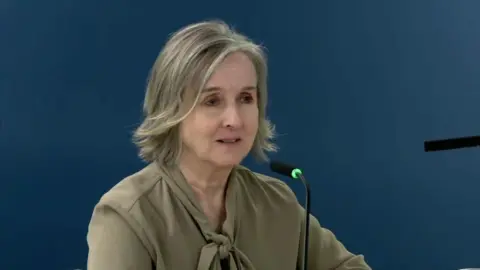Covid decisions made without 'oversight' after watchdog resignations
 UK Covid-19 Inquiry
UK Covid-19 InquiryThe head of Northern Ireland's health watchdog has said its regular governance processes were "missing" at the height of the Covid-19 pandemic.
Briege Donaghy, chief executive of the Regulation and Quality Improvement Authority (RQIA), told the UK Covid-19 inquiry significant decisions were made "without the effective scrutiny and oversight".
In 2020, several senior RQIA staff were redeployed and its entire board resigned after a row over the handling of the coronavirus pandemic.
Ms Donaghy said there was "anxiety" within the watchdog and Stormont's Department of Health to ensure what happened would "never recur".
The inquiry in London is examining the impact of the pandemic on the social care sector.
It was launched in 2022 by former Prime Minister Boris Johnson, who said the government's actions would be put "under the microscope"
It aims to consider government decision-making, steps taken to prevent the spread of Covid in care homes, and their capacity to respond to the pandemic.
In June 2020 the entire RQIA board quit, claiming they were not consulted on several decisions taken by the health department.
These included reducing care home inspections and redeploying senior RQIA staff some months earlier to other health bodies.
An independent review in 2021 found several issues led to the mass resignations, including breakdowns in working relationships.
'Particularly difficult'
Ms Donaghy joined the RQIA in July 2021 as chief executive.
She told the inquiry that a lot of senior experience "was gone" when several senior staff were redeployed during the pandemic.
"The regular processes of governance were missing, and the challenge and oversight of decision-making was not what it should have been," she added.
Ms Donaghy, who previously worked in a senior role in the Northern Health and Social Care Trust, said it was "shocking" when the RQIA board resigned.
"In the height of a pandemic, to be facing into such organisational issues, I mean, it would not be welcome at any time but it was particularly difficult at that time," she said.
She said it meant significant decisions were being made "without the effective scrutiny and oversight".
Ms Donaghy said the RQIA last week signed off a "partnership agreement" with the Department of Health following the independent review by David Nicholl.
"It has taken us a considerable time to get to this point," she added.
"I think it demonstrates the level of anxiety on both the Department of Health, and us in RQIA, to ensure what occurred and reported under the Nicholl report will never recur."
Inspections of care homes
Ms Donaghy was also asked about the withdrawal of physical inspections of care homes for a period at the beginning of the pandemic.
The inquiry was told that in March 2020 the Department of Health issued a "direction" to the RQIA to reduce its statutory inspection activity.
Ms Donaghy said although it was an instruction from the Stormont department, the watchdog's senior team agreed with the decision.
She said she understood there was a "fear of footfall" at the time, citing how a single inspector could be tasked with visiting multiple care homes.
The inquiry also heard how the number of inspections of care homes have not returned to pre-pandemic levels.
In the year to March 2020, there were 1,408 inspections of nursing and residential care homes and domiciliary care agencies.
The figure fell to 860 in 2020-21 and 988 in 2021-22.
In 2022-23 and 2023-24 the numbers were 1,082 and 1,099 respectively.
Ms Donaghy said that before the pandemic "there was a very strong focus on achieving the target", but that the RQIA has since adopted a "hybrid" approach.
"It's not about counting," she added.
"It's not about that.
"It's about ensuring we are using the information we have to drive regulatory efforts and ensure quality standards are met."
